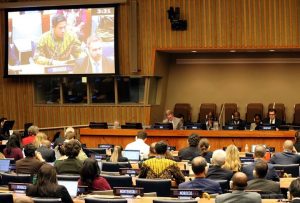Unbridgeable gap within NPT Preparatory Committee, Part 1: Creation of third category, nations under nuclear umbrella, will be “new divide”
May 14, 2025
NPT affected by confrontations within international community
by Fumiyasu Miyano, Staff Writer
It was as if a new rift had emerged among the states parties to the Treaty on the Non-Proliferation of Nuclear Weapons (NPT). The Third Preparatory Committee meeting for the 2026 NPT Review Conference, held from April 28 to May 9 at the United Nations Headquarters in New York, the United States, closed without reaching an agreement on any outcome documents against the backdrop of the severe international situation. We will review the two-week sessions to explore the status quo of the unbridgeable gap.
“We cannot accept any language that would implicitly create a third category of states.” On May 7, an Australian delegate appealed during the discussion of the draft decisions. The “third category” refers to nations that do not possess nuclear weapons but instead rely on other countries’ nuclear weapons for national defense. It means a third group in addition to nuclear-weapon states and non-nuclear-weapons states defined by the NPT. Most of these countries are United States allies that depend on its “nuclear umbrella.”
Nations wary of accountability
On the same day, the United States, South Korea, and members of the North Atlantic Treaty Organization (NATO), including the Netherlands and Canada, unanimously used the terms “third” or “new” category, directing their attack at the description incorporated in the draft: “Considerations such as nuclear sharing and umbrella arrangements.” Countries under the nuclear umbrella were wary of being called into question about the legitimacy of their nuclear policies and held accountable.
Two months ago, the third meeting of States Parties to the Treaty on the Prohibition of Nuclear Weapons (TPNW) took place at the United Nations Headquarters, where nuclear deterrence was rejected as it threatens the survival of humanity. It seemed that the same discussion was brought into the Preparatory Committee.
Traditionally, the NPT has been discussed in opposition of nuclear-weapon states and non-nuclear-weapon states. One of the allies’ diplomats openly opposes the idea that those under the U.S. nuclear umbrella will bear the brunt of the nuclear deterrence discussions, claiming it would create a new divide. Seth Shelden, General Counsel and United Nations Liaison of the International Campaign to Abolish Nuclear Weapons (ICAN), a non-governmental organization, believes nuclear-weapon states and countries dependent on nuclear weapons felt pressured.
However, this pressure did not work to elicit progress toward nuclear disarmament at this time. Mr. Agyeman from Ghana, the Chair of the Preparatory Committee, attached importance to the adoption of the decisions to enhance NPT regimes, and deleted the description of nuclear deterrence from the revised draft. This led the United Kingdom to express that it was possible to agree. The event showed clearly that the biggest obstacle to abolishing nuclear weapons is the adherence of nuclear-weapon states and some non-nuclear-weapon states to nuclear deterrence.
The expectations of each country were mixed in confusion, as if reflecting the confrontations within the international community over Russia’s invasion of Ukraine, China’s enhancement of its nuclear capabilities, and the situation in the Middle East. The Preparatory Committee got out of control and ended up postponing the adoption of the decisions.
The United States’ lack of presence
In particular, we did not see any active leadership from the nuclear superpowers. Paul Watzlawick, a senior State Department official who was newly appointed to the position, stopped showing up halfway through the first week. A diplomatic source from one of the allies explains the Trump administration is negative about multilateral cooperation and shows little interest in the NPT, and he does not even have a nuclear disarmament plan.
On the closing day, Russia pointed out in its summary that now is not an appropriate time for an agreement. A strange silence fell over the room, as if the other countries had been convinced.
Tatsujiro Suzuki, President of Peace Depot, Inc., a non-profit organization based in Yokohama, sat in on the meetings. He reflected: “It has been thought that discussions and agreements in the NPT have the power to influence the international situation. In reality, however, the opposite is true. The NPT is swayed by the international situation. We can no longer expect the NPT to advance nuclear disarmament.”
(Originally published on May 14, 2025)








